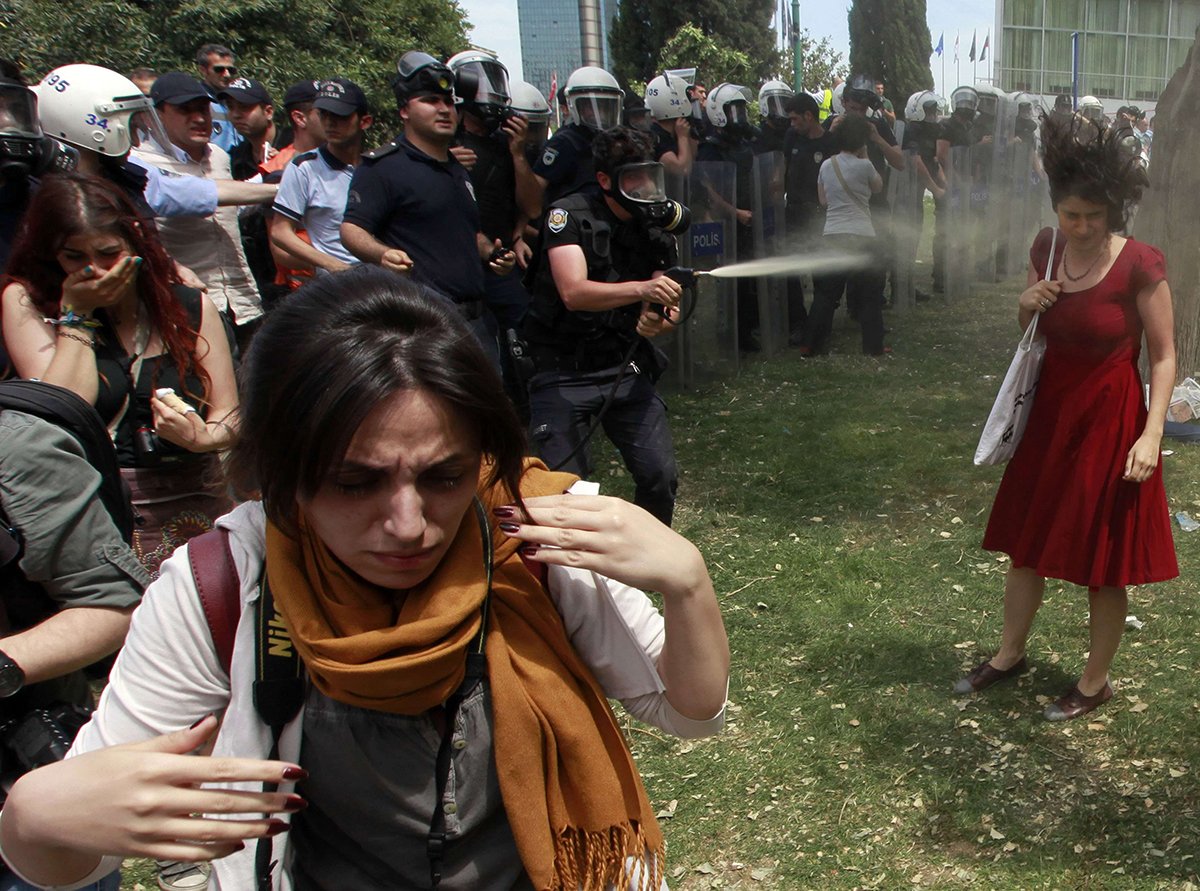
Endlessly shared on social media and replicated as a cartoon on posters and stickers, the image of the woman in red has become the leitmotif for female protesters during days of violent anti-government demonstrations in Istanbul.
"That photo encapsulates the essence of this protest," says maths student Esra at Besiktas, near the Bosphorus strait and one of the centres of this week's protests. "The violence of the police against peaceful protesters, people just trying to protect themselves and what they value."
In one graphic copy plastered on walls the woman appears much bigger than the policeman. "The more you spray the bigger we get", reads the slogan next to it.
The United States and the European Union as well as human rights groups have expressed concern about the heavy-handed action of Turkish police against protesters.
Prime Minister Tayyip Erdogan branded the protesters on Monday extremists "living arm in arm with terrorism", a description that seems to sit ill with the image of the woman in red.
There were others dressed in more combative gear and sporting face masks as they threw stones, but the large number of very young women in Besiktas and on Taksim Square where the protests began on Friday evening is notable.
With swimming goggles and flimsy surgical masks against the teargas, light tasselled scarves hanging around their necks, Esra, Hasine and Secil stand apprehensively in the Besiktas district on Monday evening, joined by ever growing numbers of youngsters as dusk falls and the mood grows more sombre.
They belong, as perhaps does the woman in red, to the ranks of young, articulate women who believe they have something to lose in Erdogan's Turkey. They feel threatened by his promotion of the Islamic headscarf, symbol of female piety.
Careers for women
Many of the women point to new abortion laws as a sign that Erdogan, who has advised Turkish women to each have three children, wants to roll back women's rights and push them into traditional, pious roles.
"I respect women who wear the headscarf, that is their right, but also want my rights to be protected," says Esra. "I'm not a leftist or an anti-capitalist. I want to be a business woman and live in a free Turkey."
Mustafa Kemal Ataturk, founder of the secular republic formed in 1923 from the ruins of the Ottoman Empire, encouraged women to wear Western clothes rather than headscarves and promoted the image of the professional woman. Ironically, Erdogan is seen these days as, for better or worse, the most dominant Turkish leader since Ataturk.
Erdogan was first swept to power in 2002 and remains unrivalled in popularity, drawing on strong support in the conservative Anatolian heartland.
The weekend demonstrations in dozens of cities suggest however his popularity may be dwindling, at least among middle classes who swung behind him in the early years of political and economic reform that cut back the power of the army and introduced some rights amendments.
"Erdogan says 50 per cent of the people voted for him. I'm here to show I belong to the other 50 percent, the half of the population whose feelings he showed no respect for, the ones he is trying to crush," says chemistry student Hasine.
"I want to have a future here in Turkey, a career, a freedom to live my life. But all these are under threat. I want Erdogan to understand," she adds.
Erdogan rejects any suggestion he wants to cajole anyone into religious observance. He says new alcohol laws, also denounced by the women, have been passed to protect health rather than on religious grounds.
Protesters are coming better prepared now than when the unrest first began. Some have hard-hats, some are dressed all in black, most wear running shoes. But many are dressed as femininely as the girl in the red dress snapped on Taksim Square.
"Of course I'm nervous and I know I could be in danger here. But for me that is nothing compared to the danger of losing the Turkish Republic, its freedoms and spirit," said 23 year-old economics student Busra, who says her parents support her protest.
COMMENTS (6)
Comments are moderated and generally will be posted if they are on-topic and not abusive.
For more information, please see our Comments FAQ


1731329418-0/BeFunky-collage-(39)1731329418-0-165x106.webp)






1731738952-0/Untitled-design-(13)1731738952-0-270x192.webp)







@Adam: Still continues, scenes are in turkey like a national picnic. People from all social communities are out their and putting their share in the protest. Turkey have never seen anything like it after 1923.
Is there a recent update on this disgraceful treatment of women in Istanbul, Turkey? What is the motive and goal in this harassment/disrespect/cruelty?
What will Turkey Achieve by Islamization ? Everyone knows what the demerits are.
Result of the protests? Unsafe to travel to Istanbul after 15 days? How long will this continue, Possibility of long term unstability in the country?
What are the likely results of protests going on? Will this unrest continue for a month or will it end within a week?